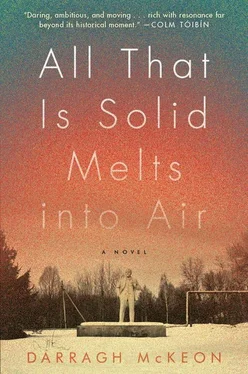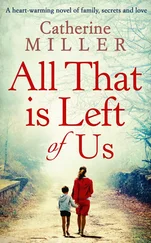The iron has a compartment for water, but the nozzle has rusted and it sprays a russet-coloured residue onto the material, so she’s taken to using the plastic bottle. She needs a new iron, but this is not something to think about, not right now, not when they let her off from work early, told her to take an evening for herself, to go home and relax—not that this is a possibility. How little they know about her.
She irons and listens and follows the progress of the evening light smoothing itself slowly across the room. This, she supposes, is her own rehearsal of sorts. Soon the apartment will be empty. Not for a couple of years yet, but it’s coming. Zhenya, when he’s old enough, will have a live-in scholarship. Maria will find a man or will be able to put aside enough to bribe someone for a place of her own. Maria will always be okay. People are drawn to her. She has that gift.
Alina thinks it won’t be too much of a shock when it comes. It will take adjustment, but it’s not as if the place was filled with a bustling family, the neighbour’s kids crashing through the door, chasing each other around the table. Maria is gone all the time anyway, especially in the past few weeks—often to teach, often she doesn’t say—and Zhenya, of course, is practicing.
She spreads out the collar and irons the back and then the front, pressing down hard on the corners.
A recital with Yakov Sidorenko.
She had to sit down when Maria told her. Zhenya’s talent has never worried her—his temperament certainly, but never his talent. What really concerned her was the opportunity. It’s all very well being a genius, but people need to realize it too. People like us don’t get those opportunities, she’s often told herself, and this has always been her secret dread, that she wouldn’t be wealthy enough or connected enough to lay out a real opportunity for her child. That in twenty years he’d be working at some menial job and spend his cigarette breaks thinking of what he could have been and resenting her, what she couldn’t provide.
And so, even before the event, she can claim a certain degree of parental accomplishment. She has brought him to the cusp of achievement. She is the one who found him a mentor, paid for his lessons, demanded diligence. If the worst should happen, if the boy crumbles under the pressure, or they’ve overestimated his promise, well, such regrets are a burden she won’t have to bear alone. No one can point a finger at her, tell her she didn’t love enough, encourage enough, provide enough.
Shirts of beautiful light cotton, cross-stitched, double cuffs, sharp collars. People in their own building, living the same lives as they are. She would like to ask them some day where they get the money for such things, but that would probably mean they’d get their shirts laundered somewhere else, and it’s not as if she doesn’t need the business. Money is still, as she so often says, life and death.
The programme is comparing the feeding habits of rosefinches to rufous-tailed robins. They tweet freely in the background, uninterrupted for long stretches, and it’s not hard to think they could be sitting just outside on her balcony, talking their talk. When Zhenya goes to the Conservatory, things will open up for her; she may finally have some time for herself. The possibility unnerves her a little. She has no idea what her interests are, no idea what she’d do besides work. Perhaps she’ll get Maria to recommend a few books for her, expose herself to other lives. She’d like to make an effort to see more wildlife, to go and stand on the top of a mountain, sleep in a tent, turn her soon-to-be solitary life to her advantage. She’s been to the park, what, once a year, since Kirill died? This is a disgrace, obviously, but parks are for those who can afford the time.
She’s never had money, even when she was married. Kirill never had the kind of sly intellect that she sees in some of the men who come to the laundry, the casually indifferent way in which they sign their names on the return slip, slide over their roubles, the way they exude assurance, how apparent it is that they flow through life unobstructed by petty concerns.
Kirill was a different type of man, possessing a more temporary kind of effectiveness, a blunt simplicity in how he dealt with things, with people, never backing down, always ready to pounce on weakness, and of course this nature provided a shelter for her younger self. Beside him she was no longer the put-upon, the victim. Such a contrast to her father: his enclosed ways, his secrecies, the weight they all carried around with them—Maria too, wary of how people saw them—which was, of course, the point. There was also an attraction for her—this can’t be denied—in the threat he posed to other men, their hesitancy in his presence, how they could sense the force of his will. On the bus, all it needed was a stare from Kirill and other men would rise, offer their seats, stumbling out of her way, embarrassed, almost hypnotized, and she would feel a surge of power too, by association, by osmosis. This was a man who could take anything he wanted, including her, who was always ready to sweep aside anything in his way.
But her older self knows that such a nature is death to a marriage. A man who could think only of the immediate, whose range of needs was essentially the same as a dog’s—his fixation with dinner, those endlessly repetitive questions, not to mention his sniffing around other women—such stupidity on her part. Power is not about dominance. She really only realized it when she gave birth. Holding that helpless child in her arms. Strength is not as straightforward as she had thought. Of course, he wasn’t there to witness it, to stand by her bedside; he was off on a weekend hunt, his pregnant wife cooking her own dinners, barely able to move. Her giving birth while he killed something. A telling symmetry there, now that she can look at it afresh. And see what she produced. Yes, Zhenya shares his extraordinary stubbornness, but otherwise is unlike him in every possible way. They would have hated each other. Maybe not yet, but five years from now, without a doubt.
Yet Maria never judged, never criticized her in retrospect. For that she is grateful. Had it been the other way around, she knows she wouldn’t have been so lenient.
When Alina received word that her husband had been killed, there were no tears: a vague sadness, yes, but no more than that. By then she hadn’t seen him in eighteen months. And she wasn’t even surprised. Of course his macho vanity would get him killed. Of course showing his comrades how courageous he was would be more important than coming back to his wife and child. It’s easy to be courageous in a war. See what it’s like to work a seventy-hour week, see what kind of self-sacrifice that takes.
Flatten the sleeve out from the seams. Run the iron forward and back.
She doesn’t miss him, but she often misses the idea of him. Feels the absence of someone to fill that role. Someone to talk to Zhenya in the way that men do, that understanding they have. She’s a poor replacement, despite all her efforts.
Someone to fill that role for her too. A man to hand over a small stack of notes, let her do what she wants with them. Play money. He used to do this, on occasion, if he was feeling magnanimous. “Go and play,” he’d tell her. It wasn’t much, but the change was so satisfying: money being freed of necessity, becoming a thing of pleasure. She’d come home with a slightly damaged housecoat, or a hat that just needed a little stitching, or a pair of silky-smooth tights, and feel as fresh as a sixteen-year-old, and Kirill would smile that possessive grin of his that she couldn’t resist and say, “I should give you this present more often.” Such are the things that linger.
Читать дальше












